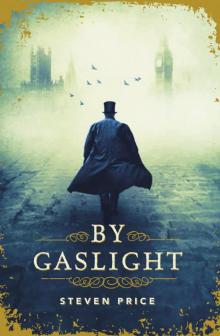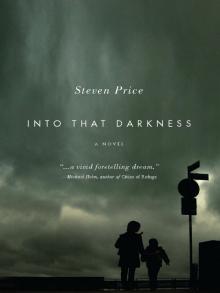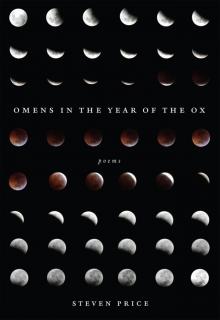- Home
- Steven Price
Omens in the Year of the Ox
Omens in the Year of the Ox Read online
Library and Archives Canada Cataloguing in Publication
Price, Steven, 1976-
Omens in the year of the ox / Steven Price.
Poems.
Issued in print and electronic formats.
ISBN 978-1-771314-03-9
I. Title.
PS8631.R524O64 2012 C811'6 C2011-908120-2
copyright © Steven Price, 2012
We acknowledge the Canada Council for the Arts, the Government of Canada through the Canada Book Fund, and the Ontario Arts Council for their support of our publishing program.
Cover design by Michel Vrana.
The author photo was taken by Esi Edugyan.
The print edition of the book is set in Bembo.
Brick Books
431 Boler Road, Box 20081
London, Ontario N6K 4G6
www.brickbooks.ca
About this Book
Omens, curses, the reading of entrails: means of grappling with what is out of our hands, beyond our ken.
Steven Price’s second collection is part of a long-lived struggle to address the mysteries that both surround and inhabit us. The book draws together moments both contemporary and historical, ranging from Herodotus to Augustine of Hippo, from a North American childhood to Greek mythology; indeed, the collection is threaded with interjections from a Greek-style chorus of clever-minded, mischievous beings—half-ghost, half-muse—whose commentaries tormentingly egg the writer on. In poems that range from free verse to prose to formal constructions, Price addresses the moral lack in the human heart and the labour of living with such a heart. Yet the Hopkins-like, sonorous beauty of the language reveals “grace and the idea of grace everywhere, in spite of what we do.” The pleasures of Price’s musicality permeate confrontation with even the darkest of human moments; the poems thus surreptitiously remind us that to confront our own darkness is one of the divine acts of which humans are capable.
For Jacqueline, old friend
Contents
The Crossing
I
Field Guide to the Sanctuary
Odysseus and the Sirens
Chorus
Jarred Pears under Dust
Icarus in the Tower
The Wrecking
Chorus
Danube Relic
Auto-da-Fé
Bull Kelp
Arbutus
A Gloss on Arbutus
Raccoon in Ditch
Chorus
Reparations
Bach’s Soprano
Orpheus Ascending
II
The Tunnel
Midwife’s Curses
The Tyrant’s Physician
Medea
Ghosts
Gardener’s Curses
Three Blues
The Inferno
Curses of the Blind
Omens at the Edge
III
The Excursion
Dream of the Fisherman’s Wife
Omens in the Year of the Ox
The Persian General
Chorus
Dr Johnson’s Table Talk
Plumb
Odds Were
Kid
The Boy Next Door
Chorus
Late Rehearsal: Requiem in D Minor
The Second Magi Returns to Parthia
Stations of the Geode
At the Edge of the Visible
Transparencies
Mediterranean Light
Omens at Dusk in the Year of the Dragon
Notes & Acknowledgements
Biographical Note
We pass these things on,
probably, because we are what we can imagine.
Robert Hass
The Crossing
I
So. At the end of the middle of your life
you wake, rain-shivering, to a white railing
in a shriven dusk. A strangeness churning
under the hull, the great blades boiling through
ferruginous waters. So the ferries sail still
in this late age, vast holds half-full of souls.
And so you rise, each day, more than you were.
Exhausted, maybe, into silence. When Bridges
wrote, How is the world’s bright shift held
in such a cluttered line? Hopkins, in a rage,
had no answer. Or none beyond his poetry.
Rain in silver ropes overrunning his faith,
his metre marking long great gulps of night air.
So the waters gulp at the mournful hull,
so the rusted bolts bleed. You unfold both
fists in the charred coastal dusk, watching
a white chill krill across their skin. Bright shift,
cluttered line. If the ill of the world issues
up out of the world, then there is no course
but to praise it. As Hopkins praised it. In the straits
a slack foam froths blackly in the scum, and you
who are water stare at that water, blurred
by old hurts praise holds no part in, here
at the edge of a dark crossing that is always
evening. As if called to account for a life
lived in the provinces. But there is no
calling to account. You sway at a railing
staring west, towards desolation, that is, forgetting.
II
In Gaudí’s Palau Güell, with her. How the walls
wept into form, as you wandered hall to hall
in that black building, astonished such a shape
could hold. The built thing made bright shift of.
Gaudí had given Güell an allegory of the cross,
both sculpture and story. It was a spatial truth
he’d sought: an ascension up, up
seven stories towards the spires of heaven.
That cellar with its termitic columns,
that cellar where partisans were tortured,
that cellar of sand, dust, stone: that was Hell.
You rested under the white shards of pottery
on Gaudí’s rooftop, watching a white cat pour
past her ankles like blood-threaded milk
while a red sun drenched the staggered chimneys.
How she looked at you, suddenly perplexed.
And when you asked, What is it? she laughed,
having just forgotten what it was. Nothing,
she said, meaning everything she already had.
There is your desire, and her desire, and each
touches many things. You carried Hopkins
all through Spain, wanting to get closer
to something. His stark Jesuit suffering, perhaps.
Tracing your burned fingers along the cool
ancient stones in the narrow streets
of the Gothic Quarter, his music
in your head. We believe we are living
one life and learn too late we have been
living another, she said. If all our pasts
are possible pasts then we are no kind of gone.
On Gaudí’s tiled roof she pointed past a line
of smoky blue spires in the Barcelona haze,
and you felt your future darken before you.
Does it matter now if none of that is true?
You know that you cannot, maybe, bring her
into that city, where she was not. Still, there
she waits, as you waited, under the locked
iron grillwork of the Palau Güell, sick
with absence, which was the real crossing,
and was in everything, and is, and has no end.
III
The smoky waters are the still sou
r yellow
of poisoned milk. A brooding sky recedes.
At the stern a ragged passenger perches,
collar rolled cold against a windblown dawn,
almost her. You shade your eyes, look away.
Frenzied light, sea like crumpled foil—
the world burns redly up out of the strait,
silent, and vague, and sinister, like a dream
interrupted. You had been reading about love
and evil, how the one would transcend
death and the other deny it. Death
being both bright shift and the upwelling.
So your shadow ducks the deck’s edge
to shatter in the spray, and so you go
back, going back. To the monster that stalked her
through a clattering train carriage in Catalonia,
who shuffled like an old man, who shouldered
no luggage, blue eyes half-kind as he stared
her into meat, trembling with age and what
already had been done and what he would
do again. Evil is its own element,
and real, it pours from itself like a sea, all flux,
whole and divisionless and without center.
When next you see her she will not, it’s true,
be who she was. You watch night bell murkily,
fathoms down, sinking deeper; at the far rail
a faint sun flares, its vicious hooks flowing
round you and in you, clutching for purchase.
In the swells the grizzled gulls glide and cry.
She will never, will never, will never die.
IV
What is steadfast? Nothing is steadfast. You
sailed for the desired world, remembering.
How Gaudí’s friend and patron, Güell, died
of a burst heart in 1918, and the works fell still.
Fierce, shabby Gaudí. Shuffling into decay.
That was the year Bridges dredged up his dead
friend Hopkins’ forced and gnarled verses,
in a brief embarrassed print run. Few copies
survive; the poems go on. What is steadfast?
Sunlight shivers on the face
of the imperceptible now, as if in answer.
V
In the end all is a river that flows from fog
to fog, that darkens the selves within us.
In the end, for the tides, this world is the world
it was. So the waters recede and recede,
so you trudge out after them, hopeless.
Trusting a far shore exists. Absolute
love, wrote Bridges from the long drift
of his fame, is measured hour by hour.
Where I say hours I mean years, mean life,
wrote Hopkins. All of us arrive, somehow,
in the here. The black firs loom and pass
in the cold light of the crossing. Far out,
gulls drift and disarticulate in the grey,
their song an ugly, rasping appetite.
As it is in all of us. The final waters,
fanged and liquid, open under our feet.
Who wrote that? A Spanish poet, most likely.
You remember walking the fragrant lanes
of Mojácar at dusk, the lemon trees belling
low over the orchard walls. As you crossed
a corner into a gulch a huge darkness
detached itself from the ditch and glided
growling out, all sinew and razored shadow
blocking the middle of the end of that road.
Its black hackles bristling. And you understood:
you could go no further.
Field Guide to the Sanctuary
I
A grey lagoon searing dark
with chill winds. Rockstrewn
strands lashed and scoured.
What eddies here wants
no mercy. Is salt and savage.
Snub-blunt and sculling
the grey gulls punch
their weight in the spray, lift,
hang over humped middens
shingled to chalk-shell,
shaled and cold. Watch
their world wheel under.
II
I have seen this, seen
this. The dart and snaking
barb of swans at feed.
A slow child swarmed
by slithers of char-geese, dragged
howling into black water.
The folded plunging incision
of hawks in the wash;
feathers scalpelling the air,
sharpening. Look dead
in any eye: terror
clockworks there.
III
A mallard’s worm-
swaying skull swivots, stabs,
plicks at greased gun-
feathers underwing. A wind rises:
the steel waters sheen and chop.
One gull swells up, is blown
like a plastic bag out over the drop;
most wait out the worst
huddled grim. The world
here is harsh, guttural, or still.
Threnody plays no part.
On an outcrop, now, kneel,
observe the birds’ ferocious art.
Odysseus and the Sirens
Here
their
fear
churned
him hard;
that scarred
smoke-glarred
strand burned
like black shell;
his men held
their ears well-
stogged with wax
and cut, dipped, dragged
through froth oarblades,
old shafts gone grey—
their knuckled backs
wracked by hard rowing—
as, lashed fast, flowing
with rope and roping
his muscles in knots
of their own cording, he,
Odysseus, hung; leaned
low, gasping at that beam,
bloodied ears shunted shut—
when came the breached dream out of the sea.
Scorched wharves. Slit fish noonspackled with heat.
Now was this land that he knew; now surging on past could he make out
white hills, sunhammered, walls hazed in the blur
and his eyes afire hawked fast, hunted her—
not this, nothingness, this
no-song of wind and hiss
and spray, gulls in tall gusts
shoaling over shore rocks—
in that rain-flared chop
their oars, all surge and scup
of salt-stripped cedar, stopped;
he stared back in shock:
a battered beach,
kelp-strangled, seethed
with mysteries
and wind-amped cries
damp with want;
he shook then;
he, ropes rent,
shut his eyes—
that land
of stunned
black sand
was love:
shore
our
horrors
sing of.
Chorus
In they’d drift, almost motes, like echoes
of the eye, like articles of dust
stirred in the drapes’ dreary pall.
“See with the eye,” they admonished,
“and seeming will be less and less.”
“He has no ear for longing,”
sighed one, or was it: “He hears no air
of longing”? I screeled clear the drapes
on tarnished rods, seeing neither shape
nor shroud. “See,” said another,
“he sees nothing not his own.”
“We are his own.” “Or were his own.”
Knuckling shut my eyes to caulk shut
my skull. “He thinks he can ignore us,”
; one hissed; “this singing he signed on for
never had sense in it.” “Stubborn.”
For God’s sake, I muttered, I can hear you,
I’m here, I’m right here—
At which each silvered into blessed silence.
I listened to the sweet nothing
adrift in the drapes. But then:
“Did he just say he’s right?” “Right here.”
“Who is he?” “What is right?”
“Where is here?”
Jarred Pears under Dust
A man’s bruised hand glows
like glass. Unthreads the lid,
pries back the brass cap
in a wet suck of icy air.
Jarred pears drift in flecks
of what serene fire, drift
burning with what sweetness.
In any jar an inner autumn
rises: calved pears float
pure, float white; and a boy’s
bruised hand pours out
light. We walk a heavy
orchard all our days
to watch such white fruit fade.
Icarus in the Tower
As if winched in harness
he works late, his withered desk’s
worn olive-wood blurred—
works, all wax and bristling
quill in the murky wine-dark shine.
O my strange, sad father.
How he does not see me.
Tangled in the bars of our cell
the lyred tendons
of dried seabirds
stretch, or split, or dangle
over scrolls we sketched for lift.
I lie like a coal in the dark straw
seething with light.
I stare and stare.
He shuffles forth
in his frail creaking contraption
of leather-twined harness,
rib-crossed strap. In candlefire,
clips the brass buckles fast,
the wings soft in the smoky burn.
Then turns; mutters; widens
the twiggy light-as-bone
wingspan of his wattled arms.

 By Gaslight
By Gaslight Into That Darkness
Into That Darkness Omens in the Year of the Ox
Omens in the Year of the Ox